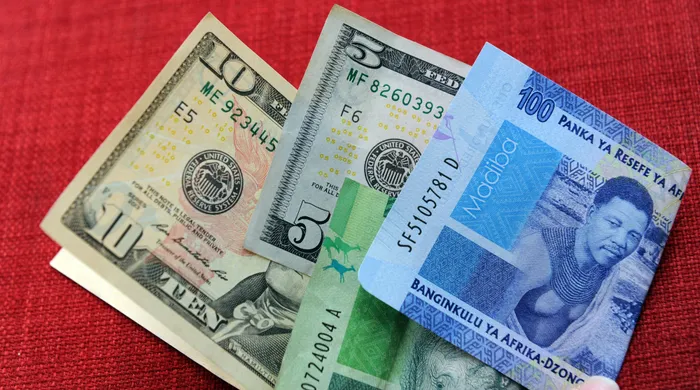Travelex says US dollar to remain Africa’s gold standard

US dollar and rand notes. Photo: KAREN SANDISON/Independent Newspapers
Nicola Mawson
The US dollar is set to remain Africa’s currency of choice despite suggestions of a Brazil, India, Russia, China, and South Africa (BRICS) currency being in the offing, and the continent’s love affair with China.
This was said by Travelex wholesale finance director Adam Kettle in an interview with Business Report on Friday.
Kettle said that, based on the forex company’s experience, the US dollar was a key currency for the continent, especially during volatile times as it was seen as being stable.
Kettle added that while some countries in Africa and even globally were trying to push trade and financial transactions between them in local currencies, Travelex’s experience over 20 years of trading in Africa under its current brand, and as Thomas Cook before that showed that the greenback will remain a dominant currency.
“Our business into Africa has always been largely polarised. You know, we probably trade into Africa around 80% to 90% of our volumes,” Kettle said.
Travelex currently ships dollars into 20 African countries, including Zimbabwe, the Democratic Republic of Congo, Chad, and Kenya.
Kettle said it was easier to trade across borders with the US dollar than local currencies.
Kettle and his colleague Ross Martin, Travelex’s senior banknote dealer were recently in South Africa to meet with local and African financial institutions about possible expansion opportunities.
The company has six trading desks and 14 vaults or cash processing centres across the globe.
Martin added that, even with a “sort of falling out of love with America” over about the last year, which led to countries such as Uganda refusing to work with the forex company, Travelex had expected some sort of move towards rather holding either the Russian ruble or the Chinese yuan.
Yet, he said when people seek a monetary offering to store they prefer the dollar.
“It’s still the number one currency,” he said.
Matrin said about a decade ago, there was a move towards the Chinese currency but this only lasted a few years before Travelex ended up buying back all the cash it had sold to those African countries because of the Yuan’s volatility.
More recently, with the global pandemic that upended the world, countries and people were keeping US dollars as a safe hedge, said Martin.
“When things get rocky, you know, people start buying US dollars. And they stick it in mattresses, not the banks, just to have in case something happens,” he said.
As a result Martin said Travelex was still seeing a backlog of US dollars being shipped back to the US.
He also said Travelex had noted an increased demand for mint dollars to combat counterfeit notes being put into the market, especially after the emergence of the almost perfect “super dollar” – very high quality counterfeit $100 bills – several years ago.
In conjunction with the US’s Secret Service, Travelex provides training in the countries in which it operates for people such as tellers who handle the money, to aid them in spotting a fake, he said.
Martin said Travelex was also compelled by the US’s Federal Reserve to report trade in dollars, which would allow the country to pick up forex manipulation.
Meanwhile, US Treasury Secretary Janet Yellen last week admitted that sanctions affected the US dollar and that de-dollarisation was now her biggest fear.
Testifying before the House Financial Services Committee on how to protect the status of the US dollar, Yellen said that “the more sanctions the US imposes, the more countries will seek financial transaction methods that do not involve the US dollar”.
“The dollar suffered a stunning collapse in 2022 in its market share as a reserve currency, presumably due to its muscular use of sanctions,” she said,
“Exceptional actions taken by the US and its allies against Russia have startled large reserve-holding countries. The US dollar’s continued dominance is not preordained.
“The prevailing view of ‘nothing-to-see-here’ on the US dollar as a reserve currency seems too innocuous and complacent. What needs to be appreciated by investors is that, while the Global South is unable to totally avoid using the dollar, much of it has already become unwilling to do so.”
BUSINESS REPORT